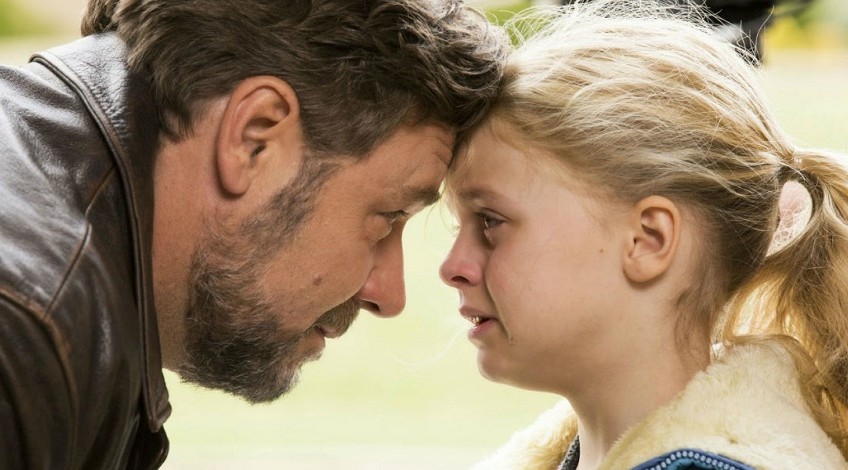Joyce Glasser reviews Fathers and Daughters
Once upon a time Russell Crowe won an Academy Award (Gladiator) and was nominated for another one (A Beautiful Mind), in films that won a slew of important accolades. That was then and Fathers and Daughters is now. While there is plenty of sentimentality, expository writing, melodrama, improbable characterisation and overacting on show there’s not a trace of a beautiful mind at work behind Director Gabriele Muccino’s (The Pursuit of Happyness) Fathers and Daughters.
Neither Crowe nor Muccino are helped by a script by first-time feature writer Brad Desch that landed on Hollywood’s infamous Black List in 2012. Reader, have you ever heard of Jake Davis? No? Well, you should have because, as his loyal agent (Jane Fonda) tells a crowd of worshippers, he has won two Pulitzer prizes and ‘just about every book award out there.’ This is Desch’s most obvious gaffe, but it is by no means his first or foremost.
Crowe plays Jakes Davis, the aforementioned Pulitzer Prize winning writer and father to little Katie (well played by Kylie Rogers) whose life is destroyed by the accidental death of his wife. We’ve seen it before, but can still imagine the guilt suffered by a husband whose wife dies in a car crash caused when he took his eye off the road during a heated argument about his infidelity.
We cannot quite imagine Jake having an affair when we meet the loving and doted-on father struggling to send his Katie to private school and pay the bills. His anguish over his wife’s death manifests itself not only in depression, but in seizures so physical that they resemble severe epileptic fits.
Jake’s doctor convinces him that he needs institutionalisation, and he duly delivers Katie to his frosty sister-in-law Elizabeth’s (Diane Krugar) enormous mansion, paid for by her wealthy husband, William (Bruce Greenwood). In what seems like no time (we never see Jake checking in), he is discharged. But when he goes to collect Katie, a huge custody battle begins because Elizabeth wants to bring up Katie, and her sociopathic husband has the mindset and financial resources to drag out a law suit.
The film then shifts gears and time zones, becoming a parallel story of the adult Katie (well played by Amanda Seyfried), now alone in the world, and her classically manifested fear of abandonment. If no one becomes close to her, she will not lose them. Unable to form normal relationships with men, she sleeps around masochistically.
Then she falls for Cameron, a devotee of her father and, surprise, surprise, a writer himself. Although he is penniless and lives in dingy digs, we are not to think his attraction to Katie is financial as we learn that his parents are rich. Rather improbably for a social worker, whose sole client is Lucy (Quvenzhané Wallis) a neglected young girl with similar abandonment issues, Katie lives alone in a pricey Brooklyn townhouse.
The mother-daughter like relationship between Katie and Lucy, while woefully contrived, is surprisingly tolerable due in part to Wallis’s understated performance and expressive eyes. Wallis was the girl who shot to fame when she was nominated for an Academy Award at the age of five for Beasts of the Southern Wild. She then starred in the disappointing adaptation of the musical, ‘Annie.
Meanwhile, back in the Jake Davis strand, Jake’s novel Bitter Tulip tanks and he is facing bankruptcy, unable to afford the lawyers to fight the custody battle. To make money, he spends sleepless nights writing an autobiographical opus called Fathers and Daughters. After he delivers it to his long-suffering agent, Jane Fonda is rewarded for her long career in cinema with the best expository line of the year. When Jake tells her he does not know if it’s any good, she replies: ‘That’s what you told me when you brought in Leaving the Dance. The book you won the Pulitzer Prize for.’
Beyond the sentimentality and simplistic platitudes of this over-budgeted tear-jerker, what grates is the superficial and crude characterisations and the lack of emotional resonance to match the drama of the soap-opera plot and sub-plots. There are actually three stories, if not films, in this one and, while Editor Alex Rodriquez manages to string them together effectively, none of stories are allowed to develop or reach an emotional peak.
Aunt Elizabeth actually has a case in her resentment of the man who cheated on her sister and was driving the car in which she died. But the filmmakers turn her into the child-stealing villain of a Disney movie whose true nature is manifested by her tendency to knock back whisky from expensive tumblers when stressed. Aaron Paul might shine in TV’s Breaking Bad, but he is never much more than stiff and clingy as the romantic Cameron, sanctimoniously willing to make an honest woman of the fallen Katie.
Crowe is given full scope to overact in a way he couldn’t have imagined before he became famous, returned down under to raise a family and needed to make a come back. In his heyday, he gave a credible performance as an asocial genius in A Beautiful Mind, but his portrayal here of a distressed widower is more pot-luck than anything rooted to the, admittedly unhelpful script. Three talented actresses over 45, Fonda, Janet McTeer and Octavia Spencer and are slotted into fleeting, underwritten parts, no doubt for their marquee value.




